— January 19, 2019
When we asked marketers what tools they were planning to use in 2019, we received more than 70 responses with nearly as many tools. They run the gamut from keyword research, site audits, backlink analysis, and content ideation to scheduling, testing, editing, link-building, outreach, and email marketing. And that’s just to name a few.
While there is no universal tool that serves every conceivable need for every marketer on the planet—and, to be sure, the right tool often depends on the task at hand—the goal is frequently the same: driving more traffic and conversions.
If you happen to be evaluating your own toolkit, 70 is an overwhelming number of options, isn’t it? So we trimmed that list down for you. Here’s a closer look at the most popular tools marketers say they’ll use in the coming year.
A competitive intelligence tool, like…
SEMrush
One of the most frequently cited tools was SEMrush, the marketing suite that allows users to evaluate their content and competitors alike with a sizable keyword database and backlink analysis tool, among other features.
“It can analyze your website on a full scale from SEO to SEM, content marketing, backlinks, SERP ranking, and social media,” said Shelby Liu, SEO analyst at branding agency Brand Buddha. “The tool works seamlessly with Google Docs, Google Analytics, and Google Search Console in order to fine-tune relevant keywords and create fresh content that keeps your business up-to-date.”
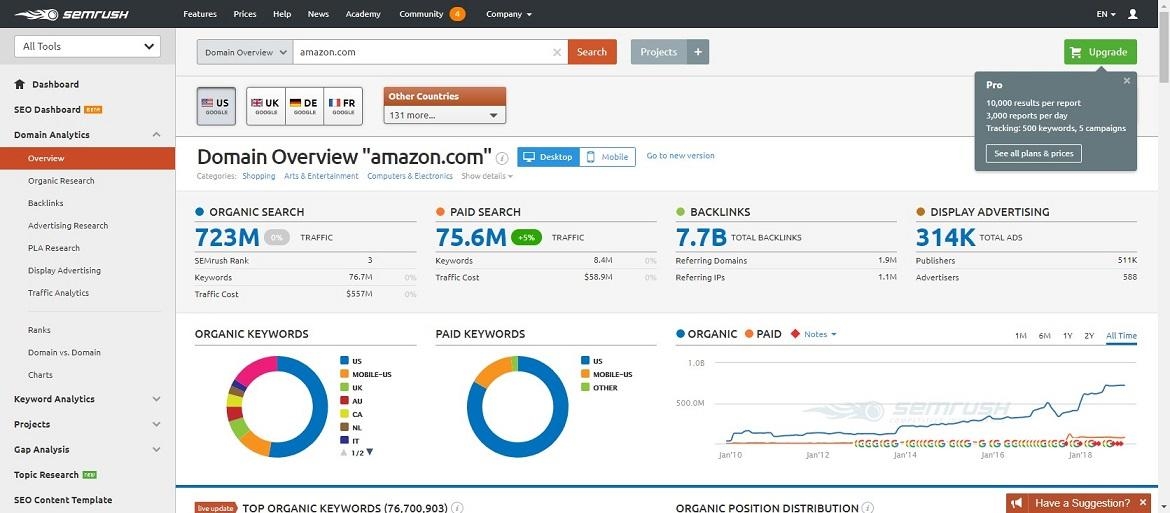
One of its biggest selling points is the ability to see what competitors are ranking for.
“Simply add your URL, and you can find competitors that you didn’t even know you had, which can provide numerous opportunities for improvement,” said Eileen McGovern, search coordinator at SEO company Efferent Media.
Chris Hornak, owner of blog writing service Blog Hands, pointed to SEMrush’s Topic Research Tool as another favorite, which he said helps develop data-driven content.
Brenton Marcum, digital marketing specialist at web design and digital marketing agency Blue Compass, agreed, saying SEMrush influences “our keyword strategy for writing copy for blog posts, articles, websites, and more for our business and our clients.”
This, in turn, means they can create “strategic and purposeful content audiences are searching for, allowing our articles to be discovered,” to earn more organic traffic, and, ultimately, to win conversions, he said.
Ahrefs
Also at the top of marketers’ lists for 2019: Ahrefs, which, like SEMrush, offers SEO and backlink analysis.
“While both have a lot of overlap, they each have unique quirks that make them valuable,” said Chris Hornyak, editor and SEO analyst at digital marketing firm The Content Factory. “In my experience, SEMrush tends to be better when it comes to keyword research and technical analysis between domains, while Ahrefs tends to be better at analyzing backlinks.”
Syed Irfan Ajmal, growth marketing manager at ridesharing blog Ridester, agreed Ahrefs has a larger database of backlinks, while Hornyak noted Ahrefs’ keyword data “tends to be a tad more accurate.”
Ahrefs has its own competitive analysis tool, which Cody Slingerland, owner of SEO content agency Jawfish Digital, said is “great for analyzing competitor or competing content and identifying keyword opportunities to target.”
In fact, SEO and content marketing consultant Jake Ballinger said it’s the only paid tool he uses.
“It does everything I need—keyword research and tracking, competitor analysis, content ideation and, now, site audits,” he said. “I live and die by it.”
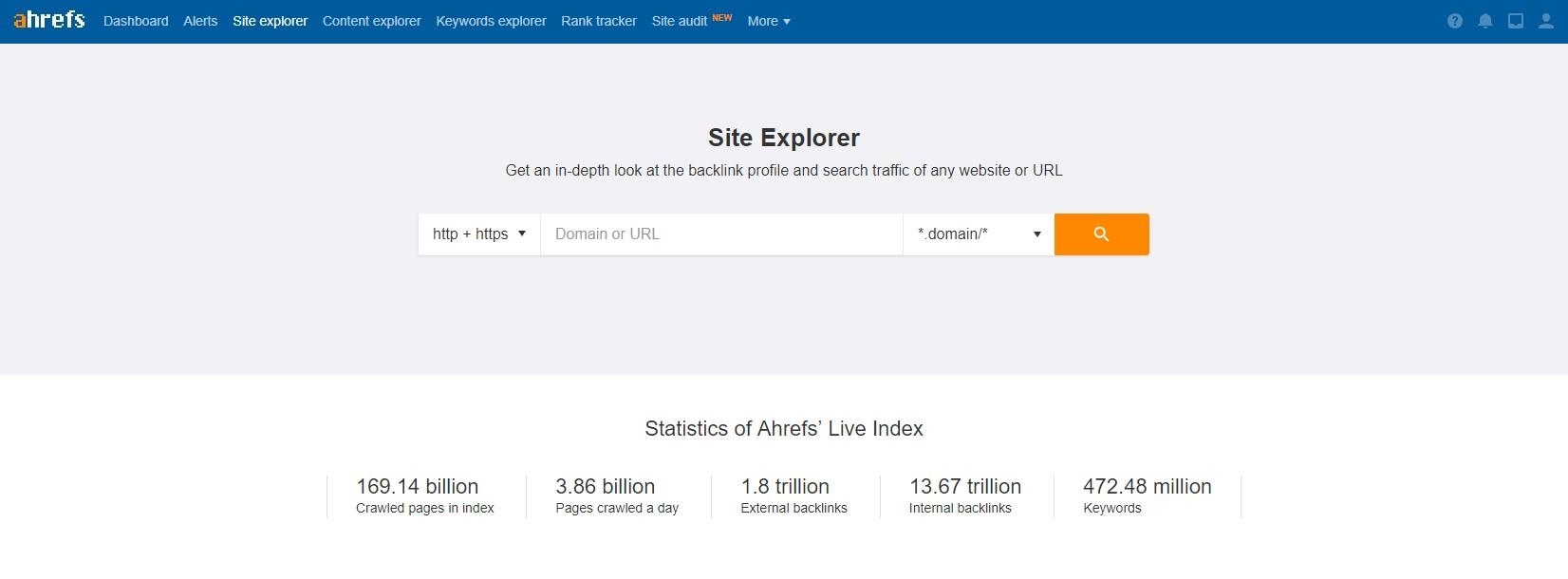
And Jon Hayes, general marketer at Authority Hacker, a firm that says it helps boost site authority, said, while Ahrefs comes at a premium, its “commitment to expanding features has eclipsed its competitors, offering everything we need in one tidy package as opposed to working with multiple different platforms.”
Serpstat
For his part, Oz Chowdhury, project/marketing manager at digital agency Powerphrase, said he is investing in SEO platform Serpstat for similar reasons.
Atanas Valchev of web design studio Pixus will, too, because he said it offers features that he hasn’t seen combined before, including rank distribution, historical data for rankings, and backlink analysis.
“The good thing is the tool collects data 24 hours a day, every day,” Valchev added.
A website crawler, like…
Screaming Frog
UK search marketing agency Screaming Frog—and its SEO Spider tool in particular—was also a popular choice.
Named after “a frog that stood up for itself after being cornered by two cats,” its SEO crawling tool, the aforementioned SEO Spider, was designed to be used by SEOs to collect data, identify technical issues, and provide a base for onsite SEO recommendations.
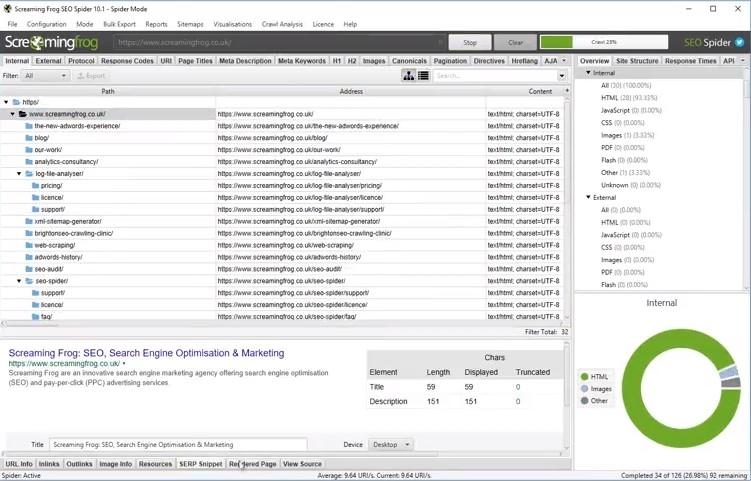
“A Screaming Frog audit shows all elements on a site, meta information, status codes and a great deal of technical information including canonicals, nofollow/noindex, and much more,” McGovern said.
She pointed to the ability to create fully customizable XML sitemaps and image XML sitemaps as a particularly valuable feature.
“In the age of ecommerce and image search, an image XML can be invaluable,” she added.
Jim Milan, communications and SEO manager at retailer Auto Accessories Garage, said his favorite feature is Screaming Frog’s Link Score, which makes it easier to identify when a page does not have enough link equity.
“If a particular page is not ranking well, we can analyze its Link Score and compare it to similar pages on our site that are ranking well to determine if it requires more internal or external links built to it,” he added.
Sitebulb
In addition to Screaming Frog, Cooper Hollmaier, technical SEO manager at digital marketing agency Visiture, said he has had “great success” in using tools like Sitebulb to ease workload.
Per McGovern, it “offers a lot of value” for agencies with many clients.
In addition to listing internal pages and their status codes, as well as meta information, duplicate content issues, internal and external links and header information, she said Sitebulb provides information about anchor text, content readability, and top linked pages, along with a crawl map with linked pages—and Sitebulb presents all of this in “an easily digestible visual format.”
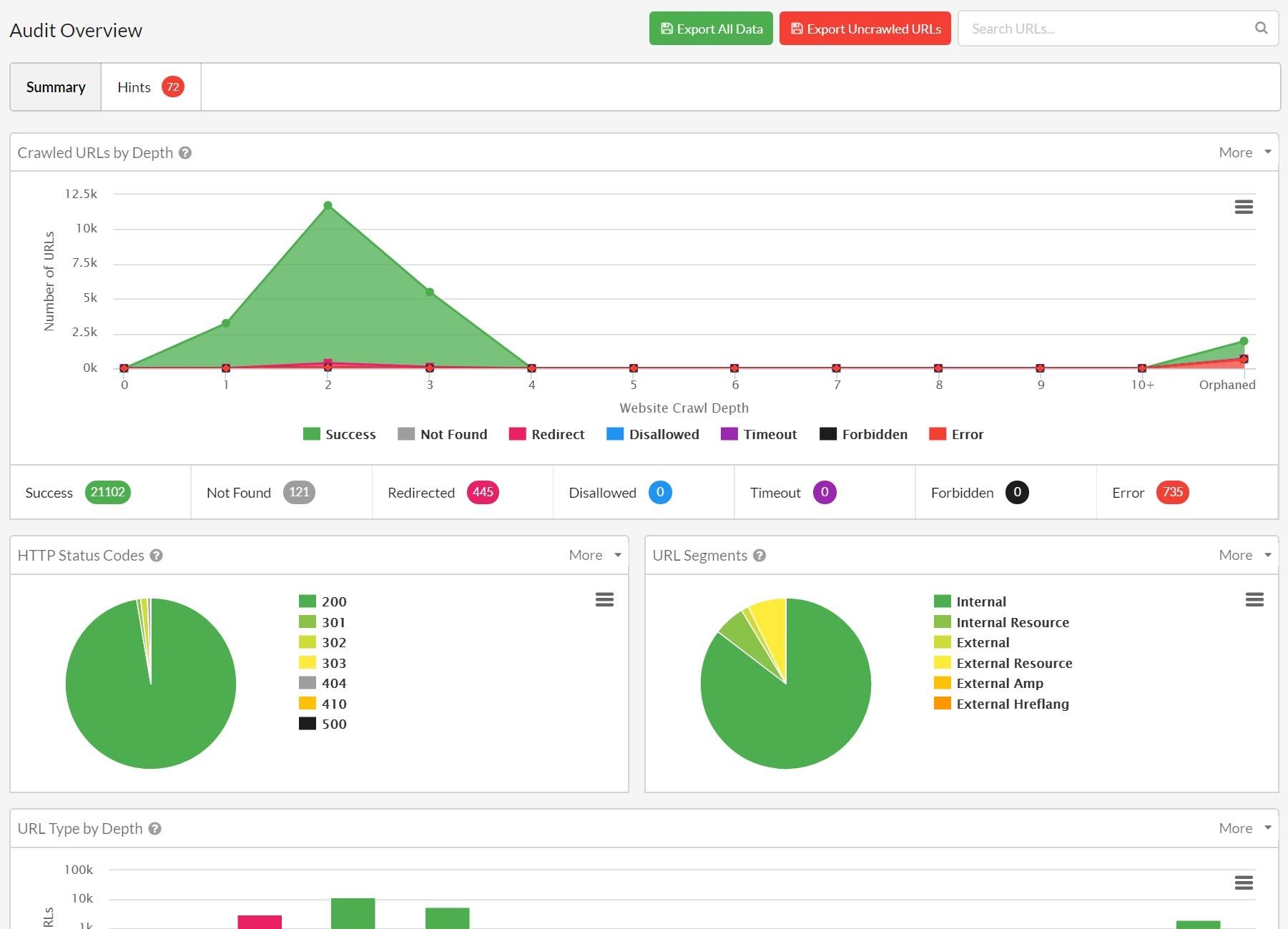
In fact, Hornyak said, “In 2018, I fell in love with Sitebulb.”
That’s because he said it helps dig up specifics about how a site is being indexed and if there are any technical issues lurking under the surface.
“While I’d previously used Screaming Frog for this particular type of work, Sitebulb currently has my heart,” he added. (Although he was also quick to note both tools “are very, very good, and it’s really just about what tool works best for you.”)
However, McGovern said Sitebulb drawbacks include file sharing and audit comparisons.
A backlink tool, like…
Majestic
Majestic says it has the planet’s largest link index database, which includes nearly 487 billion unique URLs crawled from August to December 2018 alone. It allows users to explore URLs in detail, as well as to determine backlinks and gauge search score.
Marcus Miller, head of SEO and digital marketing at the UK agency Bowler Hat, said it is his go-to link index for competitor research and finding opportunities in any given space.
That includes commercial cargo.
“It will be extremely helpful for analyzing backlinks and figuring out whether or not we should be approaching certain websites for link acquisition. We can enter our competitor’s website, and it will give us a complete list of every site that’s linking to them. From there, we can figure out which links we have the opportunity to replicate,” said Christoph Seitz, co-owner of commercial cargo shipper CFR Rinkens. “It also provides great ideas for how we can improve our own strategy.”
Seitz said Majestic’s Clique Hunter—which seeks out domains that link to multiple sites within a vertical—is particularly valuable.
“All you have to do is enter a few of your competitor’s websites, and it will show you other sites that link to them but haven’t actually linked to you yet,” he added. “This is a very effective method of unearthing new opportunities for link building.”
A link-building tool, like…
BuzzStream
BuzzStream is web-based software that helps marketers promote their products, services, and content to build links and, as its name implies, buzz.
Ballinger said he’s going to test BuzzStream to see if it saves time in email outreach.
Mailchimp
Nate Masterson, CMO of natural personal care company Maple Holistics, and Alex Tran, digital marketing strategist with ecommerce and logistics company Hollingsworth, on the other hand, were among the marketers who said they rely on Mailchimp for email marketing and internal communications.
“The popular software allows users to create unique and effective email campaigns, assess the data, and make the necessary adjustments,” Masterson said. “As an added bonus, Mailchimp can even help craft social media ads, design compelling landing pages, and draft valuable sign up forms.”
HARO
Help A Reporter Out, or HARO, is another free service marketers said they will tap into in 2019.
It is a sourcing tool for journalists, but it also helps brands find opportunities to be quoted on relevant topics.
“HARO is great for us in terms of building relations with journalists and bloggers and getting those high authority mentions and backlinks from large and mainstream publications,” Ajmal said.
Shelby Rogers, content marketing manager at content management system Solodev, agreed, noting she used the service as part of a larger link-building strategy, which resulted in a ten-fold increase in organic traffic.
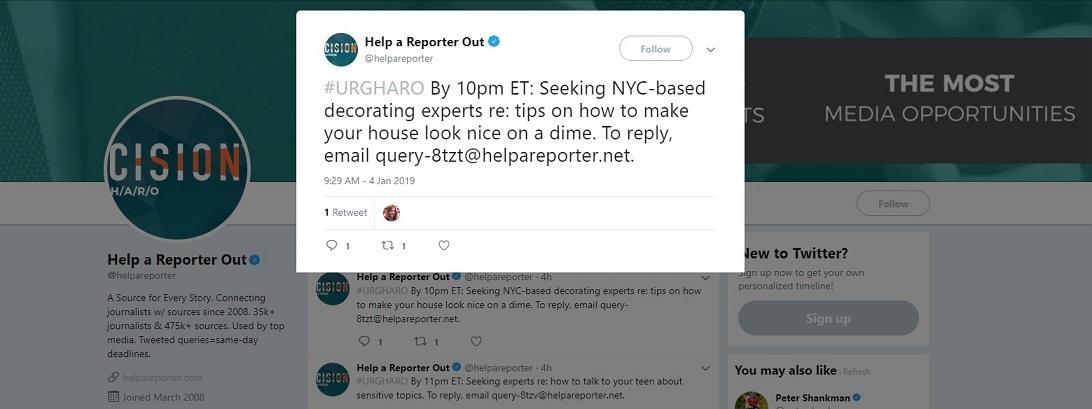
“HARO was a great way to build links and establish authority, especially for Google,” she said. “It also led to several excellent partnerships between niche industry publications. Reporters have reached out directly to us several times to get our company’s input, and those relationships have done a lot to establish us as reputable voices within CMS and web development.”
Free tools from Google, like…
Search Console, Lighthouse
Miller said one frequently overlooked—and free—tool is Google, which he called “a treasure trove of information.”
“Want to find out who or what ranks for your search terms? Google it. See what Google is rewarding. Review those results hard,” he said. “Review the businesses and the websites hard … and see what you can learn.”
He also pointed to Google Search Console, a free service that allows webmasters to see how many people are visiting their sites, how they found them, which pages are most popular and whether visitors are on mobile or desktop. Search Console also helps find and fix site errors.

Liu agreed it provides the most credible crawled data, as well as the website’s link data, the most searched keywords, the website click-through rate and crawler errors.
Thibaut Davoult, growth engineer at web conferencing software provider Livestorm, pointed to Google’s Lighthouse tool in particular, a developer tool that audits for performance, accessibility, and progressive web apps, among other things.
For his part, Paul Evans, managing director of Toro Digital, a digital marketing agency that focuses on the legal industry, said he will be using Google Optimize in 2019. Optimize is a free tool integrated with web analytics service Google Analytics, which allows users to run tests on site content to learn what works best for visitors, including A/B, multivariate, and redirect tests.
“Over the past few months, we’ve started testing different headlines and split testing URLs with Google Optimize, and the reporting you can provide clients with is fantastic,” he said. “We’ve noticed some huge differences in engagement and conversion metrics from some fairly rudimentary tests. It will make a big impact on the recommendations we provide to clients.”
And here’s what they’ll phase out
On the other side of the coin, there were a few tools marketers said they’d turn to less frequently going forward.
That includes rank tracking tools like AWR Cloud and Pro Rank Tracker because, Hollmaier said, “search engines have put so much more emphasis on the user experience than granular keyword placements, and this is only going to be more of the case as we move forward.”
“This isn’t the early 2000s anymore. You can’t just drop some keywords on a page and rank overnight,” he added. “In addition, our clients care more about—and rightfully so—organic traffic and revenue than keyword phrases, so these tools as metrics for success are not nearly as viable as they used to be.”
Hornak agreed.
“Putting too much focus on monitoring a small set of keywords will likely drive you crazy in 2019,” he said. “You should focus on optimizing your websites for topics and go in-depth into those topics so that you become an information resource for that topic.”
For her part, Krista Neher, CEO of social media and digital marketing firm Boot Camp Digital, said social media automation tools are becoming less important.
“As social media has become more cluttered, businesses are focusing on using fewer channels and managing them better,” she added. “This means no more auto-posting across channels. With a more competitive news feed, marketers are putting in the hard work to craft custom content for the channels they care about, so automation is less important.”
And there’s potentially bad news for analytics firm Moz—a number of marketers said they will be phasing it out in 2019.
That includes Milan, who said he ended his subscription because he found other software is more effective.
“Ahrefs’ crawler is much better than Moz’s at finding active backlinks,” he said. “Ahrefs also has keyword tracking, so Moz’s keyword tracking tool was redundant.”
For his part, Ramon Khan, online marketing director of retailer National Air Warehouse, said he will use link-building research tool Moz Link Explorer, but added, “Their lack of support in listening to their customers, including not updating the [browser extension] MozBar to work on Mozilla, is a big bummer, which is making me reconsider it for 2019.”
Similarly, Valchev said he will invest less in SEO tool Seobility, as Serpstat “seems to be offering all the features of Seobility and more in a better way.”
And McGovern said a tool that focused on voice and/or mobile search is still on her wish list, and if she finds one ,“I will certainly give preference to that over one of the ones that I’m currently using.”
Honorable mentions
And, finally, here are the nearly 50 marketing tools mentioned by at least one marketer.
Facebook, Instagram, and Google ad tool AdEspresso;
cloud computing platform Amazon Web Services;
video email marketing platform BombBomb;
Gmail scheduling tool Boomerang;
local SEO firm BrightLocal;
content research firm BuzzSumo;
abandoned shopping cart service CartStack;
SEO platform Conductor;
marketing calendar CoSchedule;
heatmap and A/B testing firm Crazy Egg;
website crawler DeepCrawl;
expired domain search tool DomCop;
page builder plugin Elementor;
crowdsourced calendar Forekast;
writing assistant Grammarly;
writing assistant Hemingway Editor;
inbound marketing firm HubSpot;
Google Analytics keyword tool Keyword Hero;
keyword research and analysis tool KWFinder;
link-building tool LinkCheetah;
SEO management tool Linkio;
keyword research software Long Tail Pro;
AI SEO tool Market Brew;
content planning software MarketMuse;
marketing automation software Marketo;
social media scheduling tool MeetEdgar;
blog promotion tool Missinglettr;
analytics firm Moz;
B2B marketing automation software Pardot;
influencer outreach platform Pitchbox;
social media engagement tool Post Planner;
social media marketing platform PromoRepublic;
email marketing tool Salesforce Email Studio;
keyword research tool SECockpit;
SEO platform seoClarity;
SEO software SEO PowerSuite;
sales enablement platform Showpad;
PPC and SEO firm SpyFu;
Instagram and Pinterest scheduling tool Tailwind;
Instagram stories app Unfold;
conversion optimization platform VWO;
site speed tool WebPageTest;
SEO and digital marketing tool WooRank;
CTR tool YoRocket;
work automation platform Zapier;
and, last but not least, Wordstream.
Digital & Social Articles on Business 2 Community
(141)








